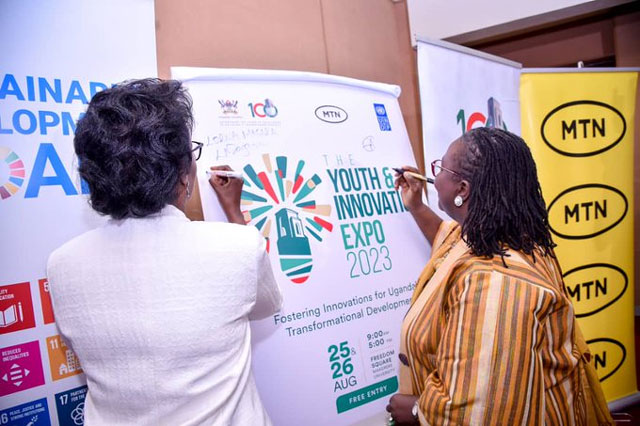
Kampala, Uganda | THE INDEPENDENT | As part of the ‘Makerere at 100 celebrations’, United Nations Development Programme (UNDP) Uganda has signed a development partnership with the university.
UNDP is partnering with universities to leverage Uganda’s vibrant public and private universities which can position Uganda as a centre of excellence in higher education within the Eastern and Central African region. Uganda has over 40 universities; 8 are public, and the rest are privately funded. Additionally, Uganda hosts about 33 science-related vocational and technical institutes.
Focus of the partnership is in five strategic areas of fostering Innovation Ecosystems in Public Universities, leveraging the Role of Universities in Grassroots Development, establishing a regular Innovation Expo as a platform for youth innovators to network and connect with venture capitalists and investors, promoting Research on Resilience, and strengthening Gender Equality in Public Institutions.
While giving her remarks after the partnership was confirmed, Resident Representative of UNDP Uganda Elsie Attafuah expressed her sincere gratitude to Professor Barnabas Nawangwe, Vice Chancellor of Makerere University and the whole Makerere University team for making this partnership possible and for elevating Uganda’s sustainable development agenda by offering to strategically partner with the UNDP.
“Thank you also to the Government of Uganda – especially through the Ministry of ICT and National Guidance, the Ministry of Public Service, and the Ministry of Gender, Labour and Social Development – and to our private sector partners who continue to work alongside UNDP and the wider United Nations (UN) Family to deliver transformational development solutions for the people of Uganda,”
“At UNDP we wish to leverage Uganda’s vibrant public and private universities which have positioned Uganda as a centre of excellence for higher education within the Eastern and Central African Region. Uganda’s public universities such as Makerere have in recent years recorded impressive results in expanding their roles toward stimulating innovation,” she added.
In recent years, Ugandan public universities have recorded impressive results expanding their roles toward stimulating innovation and invention. These institutions now mirror the emerging global pattern characterised by the increasing convergence between science, technology and innovation while actively engaging in national development policies.
An example of a university-led innovation is the Kiira Motors Corporation. Traced back to a vehicle design project by a group of students and supervisors at Makerere University, the now state-owned enterprise was established to undertake the commercialisation of the Kiira Electric Vehicle project and to champion value addition in the domestic automotive industry for both job and wealth creation.
UNDP’s Strategic Plan prioritizes innovation as an enable for socio-economic transformation and sustainable development. Makerere University’s new Strategic Plan (2020/21-2030/31) aligns with UNDP’s development approach as embodied in Makerere’s vision to transform into a “research-led” institution with a multi-discipline research agenda and enhanced engagement with industry and business sector.
As Makerere university commemorates 100 years of existence and launches a long-term agenda for the next century, UNDP has prioritized Makerere University to benefit from UNDP’s Pan African flagship initiative on “Fostering Innovation Ecosystems in Uganda’s Public Universities.”
Globally, UNDP delivers integrated development solutions driven by country priorities and informed by the pursuit of structural transformation, building national resilience, and ensuring we leave no one behind in the process. In Uganda, the UNDP Programme Offer consists of three anchor programmes (Inclusive and Sustainable Growth; Nature, Climate, Energy and Resilience; and Governance and Peace), two enabling programmes (Digitalization, Innovation and Smart Cities; and SDGs Integration and Acceleration), and one flagship programme which we call Youth 4 Development. Our programme offer is quite broad, and at UNDP we work with a broad network of experts and partners to build integrated and lasting solutions for the people of Uganda.
According to Attafuah, they will be establishing the Makerere University Innovation Pod to provide university students with a Makers Space, a Design Lab, a Collaborative Working Space and a Technology Transfer Office. The Innovation Pod/Hub which will bring students, academia and partners together from all fields of study to work on solving specific development challenges.
Through UNDP’s Timbuktoo initiative, Uganda has been selected as 1 of 11 countries across Africa to establish this University Innovation Pod. The Innovation Pod will provide a creative and innovative space which will be linked to the already well-established and sophisticated research and knowledge systems in place at Makerere University. Through this initiative, we expect to see a robust pipeline of startups from university student innovators, we expect to see realignments of university objectives and student education with market needs, we expect to see increased financial autonomy for Makerere University resulting from monetizing Intellectual Property from student innovation, and also want to see increased resources for research, and the evolution of a university curriculum to suit employer needs.
“I am pleased to announce that UNDP Regional Bureau for Africa has launched Timbuktoo to raise US $1 billion for a youth innovation financing facility for Africa. This is aimed at achieving 1,000 high-growth startup enterprises at scale across the continent, directly and indirectly, improving 50 million livelihoods in Africa, and creating value of up to US USD 10 billion over the next 10 years,” Attafuah said.
In his remarks, Prof Barnabas Nawangwe the Vice Chancellor of Makerere University said that he was delighted that Makerere will finally host an innovation hub to facilitate the transformation from research to commercial projects
“Makerere is the first University to come adopt gender mainstreaming. Twenty years ago, in the engineering faculty, we employed only 1 female but today 52% of our students are female and 35% of our staff are female,”
 The Independent Uganda: You get the Truth we Pay the Price
The Independent Uganda: You get the Truth we Pay the Price



